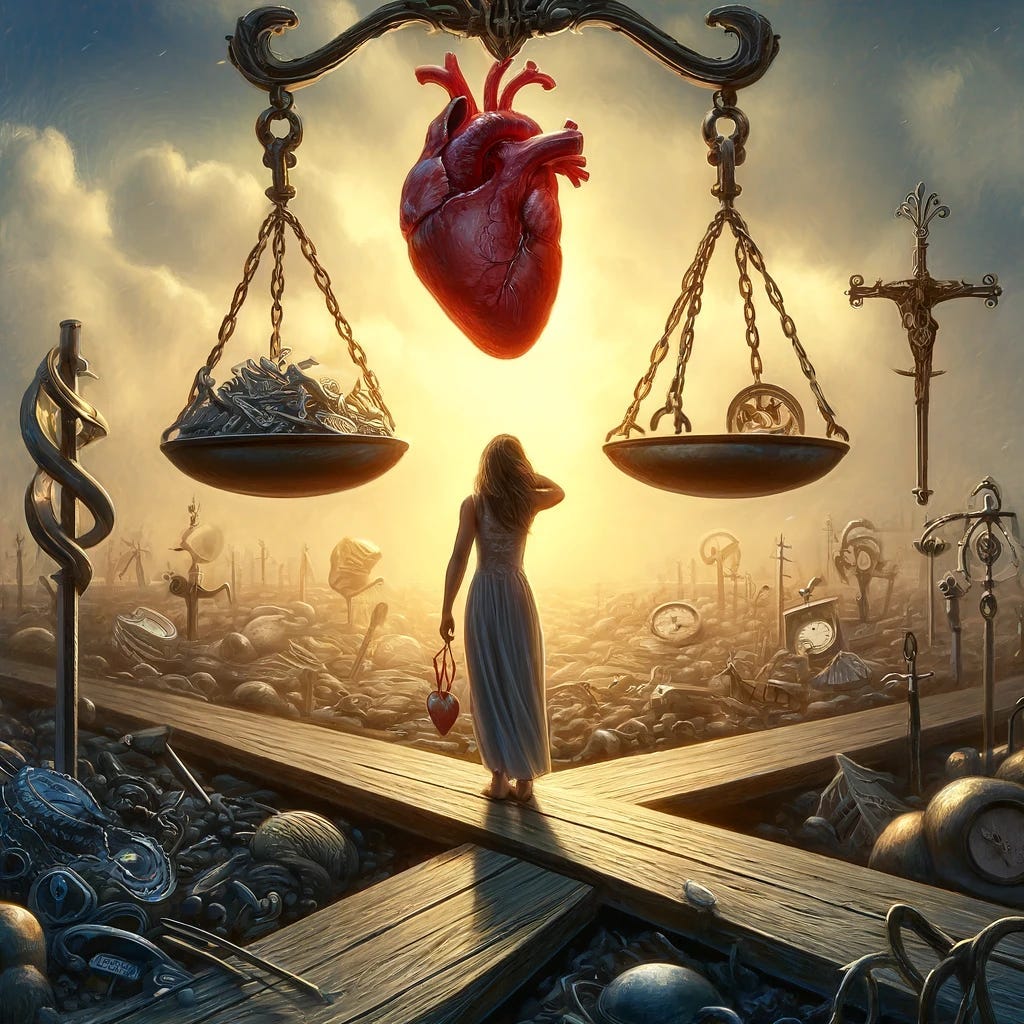Reimagining Bonds: Ethically Navigating a 20-Year Marriage Redesign
Navigating the ethical tensions of ending a 20-year marriage contract through the lens of Conscious Relationship Design — making space for autonomy and honouring the humanity of a former partner
The 20-year contract
Some years ago, I took an unconventional approach to marriage — I vowed not to commit forever in the traditional sense, but instead proposed a 20-year contract with my husband. The idea was that we would dedicate ourselves fully to creating a stable family unit for that span of time, reassessing at the end whether to renew the arrangement or part ways. While unorthodox, it was an agreement I entered into openly, grounded in my fundamental need for personal liberty and disinclination to bind myself indefinitely.
A pivotal transition
Now, as that original 20-year term comes to a close, I have made the choice not to renew our marital contract. Instead, we are pivoting into a new form of conscious relationship — one where we transition from co-habiting romantic partners to co-parents and good friends maintaining our own living spaces. It is a positive evolution, albeit one requiring immense care and intentionality to navigate with grace.
Honouring his experience
Even as I remain resolved that this path honours my deepest values around freedom and self-determination, I cannot shake the profound sense that I owe this good-hearted human a debt of compassion. He entered our union under different premises than I did, fully expecting us to be committing for life in the traditional sense. While I explicitly laid out my 20-year timeline from the start, some part of him assumed the intoxicating experience of sharing a life together would eventually dissolve my need for personal autonomy.
The residue of change
From his vantage point, my decision to end our legal marriage and redefine the boundaries of our bond must feel like an abandonment of the journey we were on. The hurt and confusion are understandable despite my transparency around these possibilities years ago. This man has been a solid, loving presence — how could he not feel a sting of rejection or sense that he failed to create conditions that could induce me to joyfully renew our vows?
A debt of compassion
When I search my heart for what I owe this person who has been so central in my life, a few core tenets emerge: Compassion. Empathy. Patience. A truly deep listening to his experience and validation of any sense of being wronged or dejected he might feel as a result of my actions. More than that, I believe I owe him an acknowledgement of the extraordinary gift our years together have been and a recognition that our life stories will forever be woven together through the family we’ve created.
Bonds that cannot be severed
Our marriage may be ending by my choice, but the intimate bonds of partnership, parenthood and deep familiarity are indissoluble. No matter how our paths diverge in the future, our years together will always remain a crucible through which I became who I am today. So, as I steer us into this next chapter of our connection, as gentle and conscious as I endeavour to make the transition, I know there will likely be moments where hurt, anger and/or confusion resurface for my husband.
Tending the tide of feelings
In those moments, I must remain steadfast in my care and non-defensiveness. To not deflect his pain, but envelope it in the spaciousness of my compassion and labour to deeply understand his experience through the lens of the premises he originally entered our union with. Even if our moral frameworks differ, his sense of betrayal is worthy of being held with tenderness. For his needs in this tender transformation are not so different from my own — to feel seen, heard and honoured for the authentic path each of us has walked and the love we have shared.
The somatic price of radical responsibility
This is the somatic price I knew I would pay for designing my life with such radical responsibility — the residue of heartache and ethical tension that comes with making judicious but inevitably imperfect tradeoffs between plural values. The pangs of knowing that an action promoting one good (my self-determination) may violate or undermine another (traditional loyalty and commitment).
Navigating plural values
As the philosopher Isaiah Berlin argued, values like freedom, equality and human rights are all equally valid and desirable in the abstract, but often come into conflict in the real world. An act that upholds one set of ethics may corrode others. The ability to navigate these difficult situations with wisdom and care is part of attaining ethical maturity.
In this case, I have privileged the moral premises around personal autonomy over traditional religious and social norms around permanent partnerships and till-death-do-us-part vows. It is not a decision I make lightly or free of the gravity of its consequences. There is a lingering compunction in knowing the pain this transition is causing someone I have cared for and raised a child with for two decades.
The path of Conscious Relationship Design
And yet, I have come to feel that making space for plural values and new possibilities is at the heart of what I call “Conscious Relationship Design” — the intentional crafting of relational containers that allow for individual growth, freedom and authenticity to flourish rather than be subsumed.
The more I have researched and worked in this area, the more I have come to believe that we need new models for how we relate intimately beyond the standard archetype most of us have been conditioned to accept — finding one romantic partner to unite with permanently until death, raising a nuclear family together under one roof. While this works beautifully for some, it can also become a life sentence to life “unhappily ever after” for many others as our identities evolve and our needs and desires change over the decades.
Conscious Relationship Design starts with the premise that plural values like freedom, autonomy, passion, novelty and commitment need not be seen as binaries where we must choose one at the expense of the other. It is instead an ethos of intentionally co-creating relationships with room for individual expansion and contraction over time. Parameters can be designed that allow for emotional exclusivity or inclusion of others at times. The same for physical and intellectual intimacies. Spaces for cohabiting and times of living apart. Finite contracts around co-parenting or keeping one’s own residence. Ethical non-monogamous intimacies or polyamorous relating structures if desired. A true pluralism of possibilities we mindfully choose for ourselves rather than defaulting to the social scripts around us.
Walking the path together
Built on foundations of deep self-awareness, emotional responsibility, clear communication and a commitment to experimentation and growth, Conscious Relationship Design imagines dynamics where each person’s core needs are continually re-evaluated and designed for, without sacrificing care and attunement to others. Where freedom and loyalty are not opposites, but interwoven avenues for everyone’s fulfillment. It is the path I have tried to walk with my husband — honouring the original contract terms he agreed to while tending to his experience with compassion as we evolve into a new, intimate-yet-independent form of relating.
Navigating the residues
Of course, this work is rife with its own residues and ethical tensions to navigate. Even as I feel a grateful release into more personal liberty in this next phase, I also feel compunctions about introducing any further upheaval into my husband’s life that his original vows did not envision. There is a tender aching around the disappointment he may feel that our marriage could not make space for both our paradigms in a way that felt acceptable to us both. A gravity around the very real losses and transformations a path like this can encompass, despite its gifts.
Holding space for all
So I hold a space of deep care for my partner’s experience of this transition. I seek to understand his pains and confusions, to validate any sense of rejection or being wronged he may feel from the vantage point of his original premises around our vows. To balance my truth with accountability to the very real human impacts it can have on someone who had a different hoped-for trajectory in mind when we first came together.
This is the messy and profound work of Conscious Relationship Design and upholding moral pluralism in our most intimate unions — feeling the full weight of the residues and losses, even as we sculpt new openings for individual and collective growth. It is a path of rigorous self-inquiry, constant communication, and at times, anguishing trade-offs between cherished values like loyalty and freedom, novelty and stability, passion and comfort.
The precipice of a novel path
And yet, I have come to believe it is a path of unparalleled aliveness and integrity to walk alongside those we love and care for. One where we can truly turn towards one another in the authenticity of our evolutions, holding pluralistic hopes, hurts and possibilities in a far vaster space than traditional relationship narratives too often make room for.
My former partner and I now stand at the precipice of such an entrance — bruised and awed by the death of one bonded dream and the sparking of another. The bonds between us remain indissoluble, now loosening to make space for novel paths of care, understanding and mutual flourishing as individuated yet connected wholes. It is an uncertain trail, but one we will tread with the hard-won wisdom of hearts demolished and rekindled by the radiant power of truth and love’s insistence on constant reinvention.
This work is a piece from my current writing project on Conscious Relationship Design. If you’d like to read along and follow more, hit the “subscribe” button to get a notification when I publish new articles on this topic.
Feel free to share this article or give it a “clap” if this piece touched or stirred something up in you. Comment or reach out if you’d like to share your thoughts. I’d love to hear from you.





